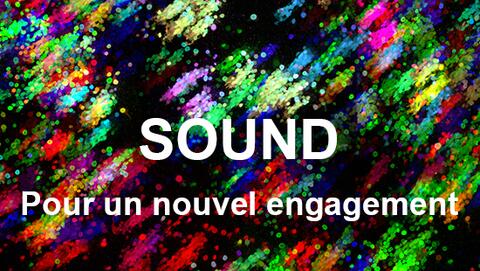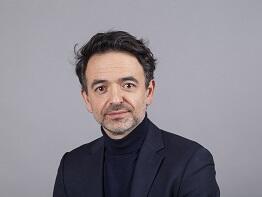
"SOUND should enable us to make our voices heard on major global challenges."
Interview with Pierre-Marie Chauvin, SOUND's political sponsor and Vice-President for Arts, Sciences, Culture and Society.

A few months after the launch of SOUND, Pierre-Marie Chauvin reviews the progress and prospects of this major transdisciplinary project.
What prospects will the SOUND project open up for the Sorbonne University Alliance?
Pierre-Marie Chauvin :
Pierre-Marie Chauvin: It should help us to structure and enhance the richness and collective strength of the Alliance. SOUND is an extension of what was initiated with the multidisciplinary Institutes and Initiatives with a particular strategic angle: the desire to share our knowledge more effectively and have a greater impact on major issues, by consolidating our methods. With a budget of 30 million euros over 10 years (2023-2032), its scale is interesting in view of the budgetary pressures facing universities and the weight of short-term support in research funding. It should give oxygen to colleagues wishing to get involved in science/society initiatives, while also supporting fundamental scientific production via dedicated theses and post-doctorates. In concrete terms, around a third of the budget will be devoted to funding scientific activity, through doctoral and post-doctoral contracts. These additional contracts, both disciplinary and interdisciplinary, will be closely linked to our strategy of opening up knowledge, in terms of their themes, methods, partnership dimension and the mediation or participation approaches they contain.
The project will also provide the means to strengthen our internal and external links, via dedicated administrative posts, but also by facilitating the mobility of colleagues within the Alliance, and by funding events, editorial actions and mediation projects to better share our knowledge with target audiences.
Beyond individual expertise, this should enable us to make our voice heard on major global challenges. To this end, we have identified three main themes: "Changing Societies", "Sustainable Worlds" and "A Holistic Approach to Health". Within each of these, more precise thematic priorities will enable us to position ourselves in a singular way, as close as possible to our disciplinary and interdisciplinary strengths.
Can you give us a progress report since the project presentation meeting in April?
P.-M. C.: Since that first meeting, we have recruited a project manager in June, launched a call for candidates to pilot the three themes and selected and positioned six pilots in September. We then worked with them on the thematic priorities for each program, and on setting up the scientific committees that will support them. As each pilot is linked to a discipline, a faculty or a member of the Alliance, the aim is to have a representation of colleagues involved in a diversity of disciplines, but also of the types of outlook and openness to society offered by the Alliance. At the same time, we have targeted the first recruitments to be made in the coming months to support the actions of 2024, particularly in the field of scientific mediation and communication.
In short, we have laid the foundations for concerted, organized and progressive action. The aim of the SOUND project is also to help us test and put in place new modes of discussion, decision-making and collective action, and to reflect on how academic fields can organize themselves to have a greater say in the world's transformations.
What are the next steps?
P.-M. C. : The Alliance's next major event will be a day devoted to young people on November 22. After the information and discussion meeting with our staff in April, the aim is to better inform and involve students, with a "Radio Sorbonne" focused on student commitment, organized around SOUND's three main themes. It will also be an opportunity to launch a "university for children and adolescents", a major project aimed at federating our various actions with young audiences (primary and secondary schools). We'll be showcasing the initiatives already undertaken by a large number of colleagues, which are very rich but often little-known beyond the disciplines concerned. The challenge is to make them more visible and better articulated, and to be able to reinforce them in the future.
The next major cross-functional day of this type will take place on April 26, 2024, and will focus on participatory science in the Alliance.
P.-M. C. :
In parallel, a multidisciplinary seminar led by Laurent Petit, professor of information and communication sciences at INSPÉ (Faculty of Arts and Humanities), will be launched in 2024. Entitled "Comment peser? Les nouvelles voies et voix de l'expertise" (How to weigh in? The new paths and voices of expertise.), it will look at the relationship between science, the media and politics, based on SOUND's themes. It will be aimed primarily at our scientific and administrative colleagues who want to work on issues of influence and mediation between scientists and certain spheres of power.
In 2024, we will also be able to create doctoral and post-doctoral contracts in line with the thematic priorities identified. We need to coordinate our activities with those already offered by the Alliance's Multidisciplinary Institutes and Initiatives. Some actions may be convergent and mutually reinforcing, while others may be complementary. On the whole, there are two pitfalls to be avoided in this kind of large-scale project: excessive concentration of resources on a very small number of narrow priorities or structures, and spreading them too thinly over a constellation of very heterogeneous objects or players. Targeting a few strong thematic priorities is therefore essential, as is creating a collective dynamic that includes a diversity of disciplines and profiles, and acting jointly with well-targeted external partners.
